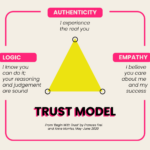CULTURE CLUB: BUILDING CULTURE AND TEAMS FROM THE GROUND UP
CULTURE CLUB is our regular column in which YOUR workplace culture questions are answered by experts Merly and Michelle. Well & Being co-founder Merly Kammerling is an ex-chef who has been offering psychological support and training since 2018. Well & Being’s leadership specialist is Michelle Moreno who has over 25 years of experience in leadership and operations. Between them, they have worked with businesses such as Soho House, Leon, Trinity, Accor Group, Brunswick House, Ministry of Sound, William Grant and Electric Mayonnaise.
In this instalment, Michelle takes the reins to explore building culture from scratch in a small team.
THE QUESTION
“I’m about to hire a couple of people to work with me for the first time, having always operated on my own or with casual helpers. We’re just a small team so I don’t think we need any big formal measures, but I’m also conscious that small teams can be complicated. What are the small things I can do to make sure my culture is great right from the outset, keeping us all happy and laying foundations for any future growth?”
THE ANSWER
Firstly congratulations, and it’s lovely to hear positive news in our industry! Growth means that you have do things differently than what you have done in the past; and you recognise that you need to evolve.
I use the word evolve over change purposefully. When I work with founders, they often feel that they have to change and as human beings, we find change challenging and often a step too far in the wrong direction. However, we have a far more positive response to evolution and we are superb at it.
Evolution in business means celebrating and adapting. Building upon existing practices and values to meet new challenges and opportunities. Whilst ensuring sustainable and aligned growth and behaviours for all.
So how might you bring in small things to make sure the culture is great from the outset?
1. 15-minute weekly catch-ups
Gallup, a global analytics and advisory firm known for its research on workplace culture and employee engagement, has found that frequent, short check-ins between leaders and their team members can significantly improve employee engagement, performance, and development by up to 3 times.
3 QUESTIONS YOU CAN ASK:
- What did you love about last week?
- What are you working on this week?
- How can I help or support you?
Benefits: The conversation is about them and not the business or you. This builds stronger relationships, psychological safety and reduces workplace stress.
2. Build a one-page communication agreement together
Communication agreements are vital in any size of business. They create a foundation for how team members interact, collaborate, feedback and resolve challenges.
Understanding when and how everyone feels comfortable with communication reduces multiple frustrations and misunderstandings.
HERE ARE A FEW YOU MIGHT CHOOSE FROM:
- Preferred Communication Channels: Which tools (e.g., email, Slack, phone) to use for different types of communication and agreed times to send or respond, especially when teams are off (as in off, they are off).
- Meetings – how often and when? Create set times – ad-hoc meetings frequently throw people off and make them feel unsafe and that their work isn’t as valued as important.
- Meeting Etiquette: i.e. rules for punctuality, and phones off and away…….yes fully away! Not a beep, not a quick glance….the emergencies are fewer than we use as an excuse of why we have them out during meetings.
- Feedback Style: How feedback should be given and received—constructive, timely, and specific.
- Decision-Making Process: How decisions will be communicated and who is involved in the process.
- Information Sharing: What information should be shared with the team and how to maintain transparency.
3. Understand how trust is built
Frances Frei, a Harvard Business School professor, is known for her trust model, which is crucial for building teams. Her model highlights three components: authenticity, logic, and empathy.

- AUTHENTICITY means being true to oneself. Being honest about your intentions and limitations and consistent in who you are.
- LOGIC involves clear, rational and logical thought processes to ideas and decision-making.
- EMPATHY requires understanding and care for others. How might it impact them?
Michelle’s conclusion
As you embark on this new chapter, remember that building a great team culture is about evolution, not overhaul.
Behaviour is key—what you do consistently as a leader will shape your team’s actions and mindset. Simple, intentional steps like regular check-ins, clear communication, and trust will set the foundation for a collaborative and high-performing team.
These actions will not only keep your team happy but also lay the groundwork for future growth with confidence and cohesion. Embrace the evolution and trust in the power of your actions.
